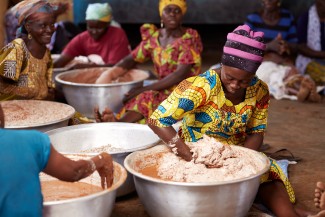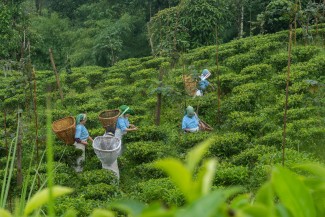|
|
|
|
The COVID-19 pandemic has posed unprecedented challenges to global value chains (GVCs). Women workers play a significant yet often invisible role in many GVCs. Amidst the mass reporting on COVID-19, there is little data or information on how women workers in GVCs have been affected by the crisis.
This article shines a spotlight on the impact of COVID-19 on women workers in ready-made garments (RMG) and agri-food value chains. It presents a snapshot, based on rapid research undertaken between April-June 2020,(1) and puts forward recommendations to promote gender equality in value chains in the recovery.
Many describe the economic crisis triggered by COVID-19 as a “shecession” since women have been economically adversely more impacted than men across all sectors. GVCs account for over half of world trade, operating through close inter-firm linkages and coordination of supply across borders by lead companies. Following COVID-19, GVC trade is estimated to plummet by up to 32% in 2020.
Hundreds of millions of workers are linked to GVCs, nearly half of whom are women. Women are concentrated in labour-intensive production, mainly in low-income sourcing countries. They play a critical role in ensuring the “just in time” supply of critical consumer goods.
Gender impacts across global value chains
Impact has varied by value chain. RMG has been particularly adversely affected as clothing is deemed non-essential. Agri-food has witnessed less severe impacts as both production and retail are considered essential. Transport and logistics have been a challenge with rising costs across all GVCs, as shipping and airfreight have been affected by COVID-19.
[related-article]
Sourcing is predominantly from low-income developing countries. Research findings at different GVC tiers reveal that:
• Higher value chain tiers (direct suppliers to lead firms): Women are the majority of waged workers employed in commercial production of RMG and food products. Male workers are more concentrated in permanent and higher-grade jobs which are more likely to be protected or quicker to be re-employed following the crisis. Women are mainly in lower grade, more insecure jobs with less protection, and are slower to be re-employed as production picks up.
• Lower value chain tiers (suppliers contracted by higher tier suppliers or indirectly via intermediaries): Women are concentrated in more informal and home-based work, or work as family labour in smallholder agriculture. But they are often invisible and their contribution unrecognised. Research found little comprehensive data or information on the impact of COVID-19 on women workers at this level, except that gathered by dedicated NGOs. Those organised in informal worker organisations or members of producer groups, with closer links to buyers, appear to have experienced less hardship.


COVID-19 has increased the vulnerability of insecure workers to gender-based violence and harassment. This includes pressure from more senior workers, often male supervisors and managers. Women locked down within households are also more vulnerable to domestic violence from male partners and relatives.
The pandemic has resulted in hundreds of millions of women workers in GVCs facing uncertain futures through reduced hours, furlough or complete retrenchment. Women workers have also disproportionately shouldered family responsibilities and unpaid care work, further limiting their access to employment. The crisis has abruptly thrown many workers and their dependents into dire poverty, without savings to fall back on.
The crisis has been compounded by lack of social protection by governments, especially in low-income countries. Social protection and emergency relief by donors, governments, companies and NGOs has helped some workers. Protection is often more easily accessed by workers on permanent contracts (mainly male) rather than those on insecure contracts (predominantly women).
Building back equitably
Work and Opportunities for Women (WOW) research indicates that currently companies and policy actors are walking into the recovery gender blind. Not enough data and information is available or requested by companies and policy organisations on the gender impact of COVID-19 in GVCs. This is particularly the case at lower value chain tiers. It presents huge risks to companies and workers should they hope to retain skills, investment and rebuild sustainable, inclusive and gender-equitable value chains for the future.
McKinsey has shown the business benefits of gender diversity. It estimates promoting gender equality in response to the crisis could add US$13 trillion to global GDP by 2030 compared to a gender regressive scenario.
Now is the time to act. More proactive strategies are needed to enhance the visibility of women workers in GVCs, and address the gender impact of the shock. The following are recommendations to promote gender equality as critical to enhancing value chain resilience, and central to building back a better recovery.
• Gender visibility and improving data capture: Companies and policymakers need to gather much better data and information on women workers in their value chains, to track gender impacts of shocks and outcomes for women workers.
• Women’s voice and representation: Women workers need to be consulted, and actively participate in formulating gender equitable strategies in the recovery.
• Social protection and stakeholder alliances: More effective alliances are needed between private, public and civil society actors to ensure all workers have more equitable access to social protection, and to support workers and their households in times of severe shock.
• Recognition and support for women’s paid and unpaid work: The essential role of women workers needs to be rewarded by employers through equitable remuneration and conditions of work; and greater support from employers and national and local governments for their caring roles in households and communities underpinning value chain resilience.
• Gender equitable recovery:Ensuring gender equality and women’s economic empowerment is central to strategies for the recovery and proposals for a new social contract capable of building back better value chains.
----------------
1. This included a review of secondary data and information (reports, blogs, briefs, websites and webinars) plus in-depth interviews with 10 companies, suppliers, standard setters and civil society organisations.
----------------
This article is a shortened version of a paper produced by the UK Foreign, Commonwealth and Development Office (FCDO) flagship programme Work and Opportunities for Women (WOW). It is based on research by Stephanie Barrientos (University of Manchester) and Charlotte Pallangyo (WG Inclusive). You can find the full research report here.
Professor Stephanie Barrientos teaches in the Global Development Institute at the University of Manchester.
Charlotte Pallangyo is Research Analyst at WG Inclusive.
Header image of a women processing shea in Burkina Faso - ©Ollivier Girard/CIFOR. Image in text of liquified shea butter being filtered ahead of packaging in Burkina Faso - ©Ollivier Girard/CIFOR. All images via Flickr Create Commons Attribution-NonCommercial-NoDerivs 2.0 Generic (CC BY-NC-ND 2.0) license.
If you would like to reuse any material published here, please let us know by sending an email to EIF Communications: eifcommunications@wto.org.


